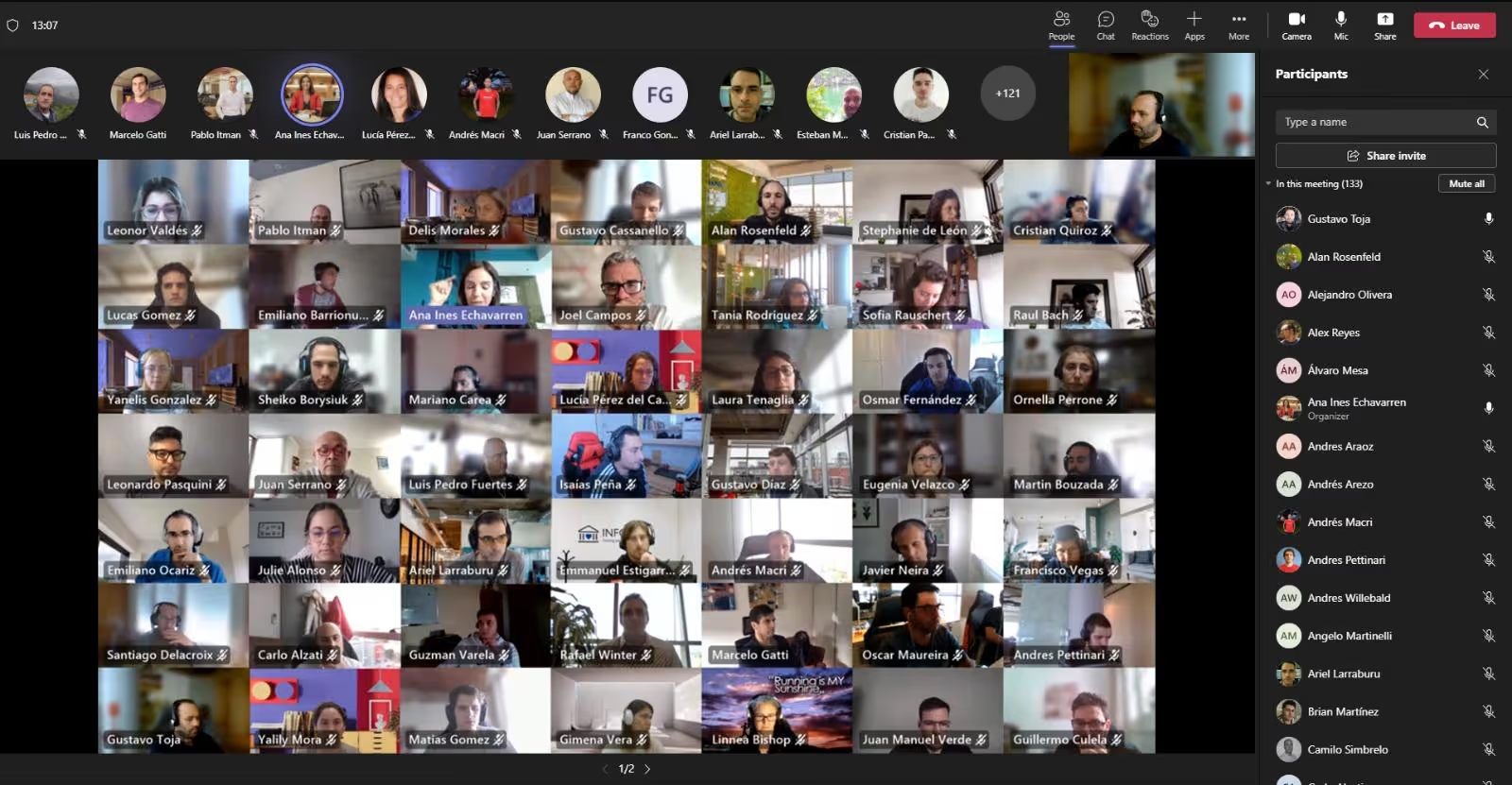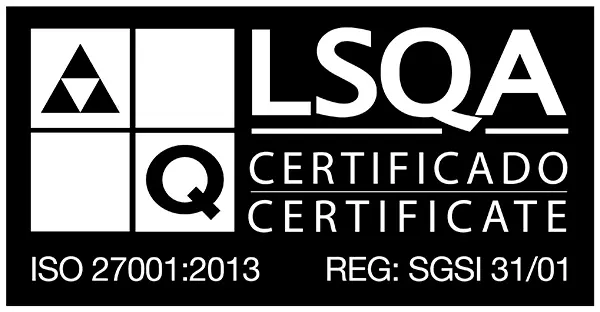“The key is to respect people's times and needs”
With this sentence full of conviction, Elena Rubin, CPO of Infocorp, summarizes the company's strategy to solve one of the most important challenges faced by organizations today: How to strengthen internal culture and build a sense of belonging in the era of remote work?
Un recent study from Buffer points out that:
98% of people want to work remotely
- at least partially- for the rest of their careers.
A decisive figure that reveals a reality: remote work is here to stay.
However, teleworking can present certain challenges when it comes to building a sense of belonging and strengthening the internal culture in a company.
How do they approach this problem at Infocorp, especially, with so much talent spread across different countries?
Elena: Finding the perfect formula to answer this question is not easy at all. Even more so when you have a lot of people working in different parts of the world. However, after trying and trying, we realized that the key was in Prioritize listening. This is something we actively do through regular conversations with the leaders of our teams, with surveys and close contact with people to understand their needs and preferences. If you prefer not to leave your house, we think it's perfect and we support you 100%. If, on the other hand, you want to work from an office, we can also offer you that option. And the mix of both clearly too.
And for those who choose to work remotely, do you think that virtuality can provide spaces for emotional connection?
Elena: It's true that some things are hard to replace in remote work. Even so, it is possible to promote actions that bring people closer together. This requires extra effort, such as taking the initiative to hold regular conversations with people to learn about their mood and make decisions accordingly. It is important to be close to our teams and promote dialogue to create meeting spaces. The key is to respect people's times and needs.

How do they achieve this goal?
Elena: One thing we do on a regular basis is to encourage travel. We try to get everyone, to a greater or lesser extent, to visit Casa Matriz, or for the people of Casa Matriz to travel to the different subsidiaries to have a week of face-to-face work with the members of their team. This way, people can work together, share a lunch, a barbecue, or go out for a few beers after work. These instances help recharge with the energy needed to continue working remotely. On the other hand, team leaders tend to travel to places where there are company collaborators to be close to them and share days that create an environment of listening and collaboration. Always, with the same goal in mind: to reinforce the link and minimize the negative impact that a situation of geographical remoteness can have. Our message is clear: we want to be close to people in every possible way.
Does remoteness stretch the time to know if a person achieves a cultural fit with the company?
Elena: At People, we seek to base our management on data. Therefore, in answer to your question, 3 months after a new member joins Infocorp, we conducted a survey that measures the adaptation of the person to the team. And although the technical results are similar to those of the pre-pandemic, the data related to team integration times are another story. It costs a little more to create links. Therefore, my answer is yes, remoteness makes it a little more difficult to adapt to the culture of the organization. Improving this reality is another challenge we face.
And to solve this problem... Where should the focus be placed, on the leader or on the talent that has just joined?
Elena: It is important that both the leader, the team members and the newcomer are involved in the integration process. At this point, the company's collaborative culture plays a crucial role. This is why, from day one, we promote open communication and active participation in the company. We have an Onboarding process that involves meetings with different areas of the company and carrying out training activities from a platform that has its own content and others specialized in different technologies, programming languages and also in human skills; we organize them into “learning paths”, depending on the role in question. The idea is that each person who joins Infocorp has an adequate induction process from every point of view. We want people to be integrated into our culture, to be encouraged to ask for help if they need it, to propose new things and to question what has been done. That he feels that he can make things happen.
Another resource that we are increasingly using is the figure of “Buddy”, someone who is not your boss or teammate, but who is there to help you feel comfortable in the organization and to make everything easier.
How interesting! How do you choose the Buddy?
Elena: It is a dynamic that we are relaunching and on which we are specifically working. We first select people who know the culture and each member of the team well, and who in turn are motivated to be part of the process of training and growth of other people. We want each buddy to have teaching skills and the dedication and patience to accompany the new members of the team in their adaptation process. As I said, this initiative has given us very good results. It's a very comforting task!
.avif)
How long does this accompaniment last?
Elena: For this year, we set out to better structure the process, but it is currently variable and can last between 1 and 2 months. Then it transforms into something more sporadic. However, when the relationship works well, the buddy and the person keep in touch and tend to end up being very close companions, even friends in some cases.
Now I would like us to put the challenges aside and focus on the positive. What good things did remote work bring?
Elena: Without a doubt, the progressive construction of a global, multicultural and diverse team. This process has allowed us to expand our borders and hire talent in new markets and continents. Another aspect that makes us proud is that we have improved the work-life balance of our employees.
How do you manage to maintain that balance?
Elena: It's challenging because the nature of remote work also blurs boundaries and there are people who “keep going”. To maintain this harmony, it is important to establish guidelines for the use of devices and work tools outside working hours. In turn, without the support of team leaders, all of this would be impossible. Luckily, we have conscious leaders, who help us promote a work environment that respects the individual needs of each team member. Obviously, it requires being attentive to identifying situations in which this balance does not exist and doing something about it, but in general, remote work has brought about a better balance between the different facets of our lives.
Although it may seem like a cliché question, I would like to know your opinion on the matter. Why should a positive work culture be fostered?
Elena: I firmly believe that a healthy environment where relationships are based on respect and mutual support is essential for people to feel motivated and committed to the team. This results in better performance and better results. I believe that people need to feel part of a team and that our work has a purpose. This enhances one of our most important assets: people's commitment.
How have you managed to make this position materialize at Infocorp?
Elena: At Infocorp, I have always felt listened to and respected. I have been able to integrate my personal values and philosophy of life with my role as leader of the People area. In my opinion, the most important thing is to find a balance between task-focused leadership and people-centered leadership. We prioritize putting people first and providing them with the support and resources they need to do their best and achieve excellent results. It is a demanding job, but with a lot of restraint on the part of the leaders and the team. In fact, it is common for people who have gone to other companies to want to work with us again and one of the points that stand out is precisely this: that at Infocorp people matter.
How special that people want to return! It's not a common thing...
Elena: Yes, we have several examples of people who have worked in the company and have returned years later. I am one of those cases myself! I worked at Infocorp as an external consultant, then in 2008 I was HR Manager with a 1-year contract and returned with pleasure when they contacted me in 2016 to lead the People area. And there are a lot of cases, thankfully. As a current ex-InfoCorp told me today: “it always comes back to first love”...
This positive emotional connection between people and the company and the team is the perfect synthesis of what we want to achieve with our philosophy.




